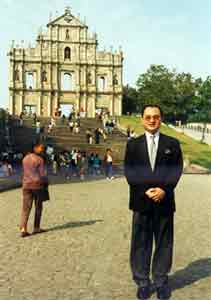Our second stop required some serious negotiation skills: we were a family, travel writers, famous, connected in the highest places. And the tuxedo clad maitre 'd showed us to a table.
It was then we discovered great food, great prices, great atmosphere. And it was then we discovered one of the nicest people we'd met since we left Japan--Nathan Lam, the food manager for the Hotel Sintra, a first-class seaside hotel filled with good people and good taste.
We drank cokes, ordered some light foods and got to talking with Nathan. We showed him pictures of our home in Alaska and learned about his family and training. He was a restaurant manager, a job he was seriously proud of, and a job he was clearly great at doing.
When it came time to leave, Nathan decided he'd take a break and show us around his city. In his sharp tuxedo and polished shoes he stowed our luggage and walked us out of the hotel and into the back streets of Macau. Twisting lanes of cobble stone, lined with elegant buildings that showed strongly their Portuguese and European lineage. All over birds sang in cages hung from plant-slung balconies, children played, and shop keepers worked at a relaxed pace--all with a different, kinder flavor than we'd grown used to in Hong Kong.
Nathan put it best when he said, "In Hong Kong the people know how to turn a profit. In Macau, we know how to turn a profit with good taste."
And he was right. The streets were clean and molded with a unique blend of "Old World and Asian World." People took time to stop and talk, smile and laugh. In fact, we noticed that the only laughter we heard in Hong Kong was the wry laughter of the English or the mocking laughter of salespeople ripping off another tourist.
With Nathan as our guide we walked to the ruins of St. Paul. Macau is an enigma. Most people are Buddhist or Taoist, yet the Catholic remnants of its long Portuguese control as a colony (since the 1500s) are in evidence everywhere, and honored along with its own roots.
All that is left of St. Paul's is a long staircase and one wall. It was built in the early 1600s by Japanese who'd fled the anti-Christian pogroms of their home country, and burned down in 1853 during a typhoon.
Without much time left to our too-short day, we walked and taxied down the tree-lined streets to the sea-side to have lunch. Nathan suggested we eat at a particularly lovely spot, the Os Gatos restaurant in the historic hotel, Pousada de Sao Tiago. Located on the point, it was once a Portuguese fort. What remains of the rock walls have been gracefully incorporated into the new structure of restaurant and hotel rooms--a true five star place with an affordable price tag, and a place not to be missed by anyone going this way.
We were running late and needed to rush to the Chinese border to catch a bus to our new destination. We left Nathan and Macau feeling silly and awkward, partly because he'd been so kind, and partly because we'd been so dumb. Had we done our homework better, Macau would have been the place for us to stay, reserving our days to visit Hong Kong, rather than the other way around.

